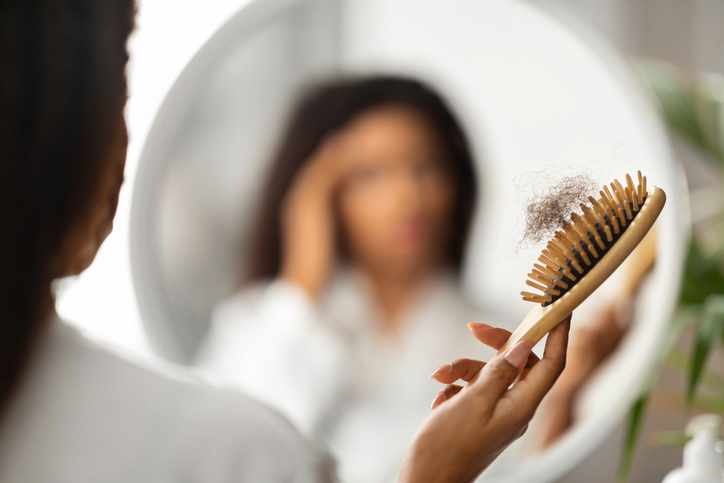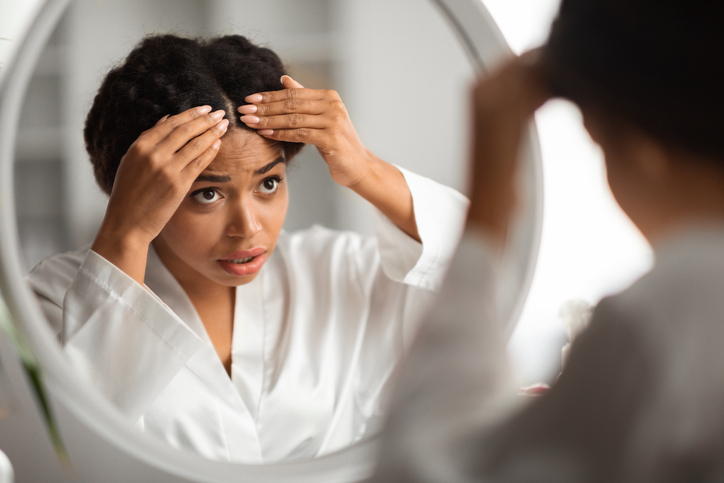Two Experts Are Changing The Approach To Treating Hair Loss
Two Experts Reveal Shocking Myths To Treating Hair Loss In Black Women: ‘Protective Styles Are Protective’
Hair loss is a traumatic experience that affects over 50% of Black women at some point in their lives. Last year, I noticed my hair was starting to fall out. After four months of agonizing over the accelerating loss, I sought treatment from a dermatologist. My doctor didn’t do much more than peer at my scalp and write a prescription for oral medication.
The shedding slowed down and eventually stopped, but not before I had my hair cropped from the long style I had worn for years into a pixie cut just so I wouldn’t have the stress of watching my hair collect into a puddle at my feet every time I washed it in the shower. I never learned what caused my hair loss and attributed it to the strain of an ongoing health crisis. Since then, I have never stopped worrying that an unexpected stressor would cause my hair to fall out again.
Thankfully, my hair continued to thrive and is now back to a length better suited to my taste.

Source: Prostock-Studio / Getty
Recently, I came across an event entitled “Rooted in Wellness: Addressing Hair Loss with Experts,” featuring two experts in the field of hair loss and hair care: Dr. Achiamah Osei-Tutu, a board-certified dermatologist specializing in hair restoration, and master natural hair care specialist Diane C. Bailey, a world-recognized pioneer in natural hair care who joined forces in 2020 to offer Black women a one-stop location to improve their hair health.
In this exclusive interview, in honor of Alopecia Areata Awareness Month (September), they share hair loss myths and the benefits of merging dermatological care and hair styling services under one roof.
MadameNoire: What are the top three hair loss myths women must know?

Dr. Achiamah Osei-Tutu
Dr. Achiamah Osei-Tutu: Three that come to mind are: One, people don’t need to see a doctor and don’t know that hair loss can be treated by a dermatologist. The second is “Protective styles are protective.” They’re not. And the third is “Stress is the main cause of hair loss.” Hair loss is the result of multiple factors, of which stress is just one. Our scalp is another organ of the body, and it can be diseased like other body parts. Hair loss is not just an aesthetic issue; it’s a health issue and is often an early sign of underlying medical conditions.
Diane C. Bailey: Whew, there are so many! “Oils are good for hair growth,” “My hair doesn’t grow,” and “Wigs are protective styles.” Many Black women don’t feel sexy, glamorous, or feminine with their natural hair. Especially their naturally textured hair. This is all based on what we have been told about femininity and sexuality. We’re told our hair has to be a certain color and look a certain way to be beautiful. Hair loss is a stressful experience. As a hairstylist, I get to wipe away their tears and support and nurture them through their journey. For too many Black women, long hair is the ultimate goal, not healthy hair. That is until they come to the dermatologist’s office when they have hair loss. Then their priorities change. That’s when they understand that healthy hair is premier.

Source: Prostock-Studio / Getty
MadameNoire: What is the connection between mental health and hair loss?
Dr. Achiamah Osei-Tutu: It’s HUGE. Hair loss can be seen as a circle. When people develop hair loss it causes anxiety, depression, and can even lead to the avoidance of social situations, depending upon the extent of it. People don’t want to talk about hair loss. They’re embarrassed. The most common type I see in the clinic is centrifugal cicatricial alopecia, and there have been studies that show it is associated with anxiety and depression. There are stress receptors on the hair follicle, which can have an affect on the condition. Because of the social and political meaning of hair, anything that has to do with hair has an outsized effect on Black women. We place a lot of emphasis on our hair and use it to place value on each other. It makes people want to manipulate their hair to look a certain way or wear it a certain way that causes (more) anxiety.

Diane C. Bailey
MadameNoire: How do you approach your clients?
Dr. Achiamah Osei Tutu: I take a holistic approach to treatment, working from the inside out. Some women come to me and they haven’t seen their general practitioner in years. When I talk to patients I ask the usual questions. What is your health history? Do you have any systemic issues, like anemia or a thyroid condition? How are you eating? What does your hair care regimen look like? What products or styling tools do you use? Have you had any new stressors? How do you manage your stress? If it’s maladaptive, such as pulling their hair to relieve anxiety, I suggest they see a therapist, too.
Diane C. Bailey: My job is to make sure they are supported before they go home. Once they leave Dr. Osei, they often have topical or medication (they need to start using) to deal with the inflammation that is triggering the hair loss. When they come to me, I am thinking “How do we address the hair and the scalp they do have so we can start the process of natural hair growth. Generally, I ask the client to make three appointments, one every three weeks. We detox the scalp and start to comb (her hair) and all the things she needs to do to take care of it. Most women get the weave or the wig and ignore it because they’re pacified because the world sees them in the way the world wants them to be. What happens now when it’s time to get a job, be intimate with their mate, or swim, or wear a hat. Now, your hair is the focal point. You can’t do anything until you get your hair right. If we go really deep, they’ll see that their hair is enough.

Source: Prostock-Studio / Getty
MadameNoire: What is the main takeaway you want people to understand?
Dr. Achiamah Osei Tutu: People are more aware now that they can go to the dermatologist and that is helping stem hair loss overall. Many don’t know where to go. Hair loss is an increasing epidemic. Don’t take it lightly. If you are having any kind of hair loss, go to a dermatologist. The longer you wait, the less likely you are to have it managed or treated because eventually you get scarring.
Diane C. Bailey: When I started working with Dr. Tutu in 2021, I had 30 hair loss clients. Now, it’s almost 400. It’s terrible, but it’s good. My practice is a single room with one chair. It’s a safe space and a place where clients look forward to coming. It’s a space where they can be really seen and heard. It’s almost like a confessional. Like when you go to church and speak to someone about their spirituality. It’s sad. Sometimes people have to mourn their hair loss. But it’s also a space of hope. The science is so much more important than the art of styling.
RELATED CONTENT: FDA Approves Medication To Treat Alopecia Areata









